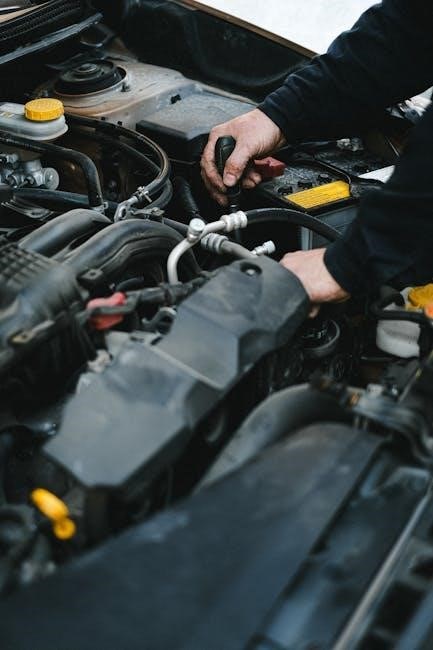The Deutz 2.9 L4 Service Manual is a comprehensive guide designed to assist technicians and operators in maintaining, repairing, and troubleshooting the engine efficiently.
1.1 Overview of the Deutz 2.9 L4 Engine
The Deutz 2.9 L4 engine is a 4-cylinder, water-cooled diesel engine designed for industrial and agricultural applications. It offers reliable performance with power ratings up to 55 kW (74 horsepower). Suitable for wheel loaders and other equipment, this engine features advanced combustion technology for efficiency and compliance with emission standards. The manual covers models D2.9, TD2.9, and TCD2.9 L4, providing detailed technical specifications and operational guidelines.
1.2 Purpose and Scope of the Service Manual
The Deutz 2.9 L4 Service Manual is designed to provide detailed instructions for maintaining, repairing, and troubleshooting the engine. It covers models D2.9, TD2.9, and TCD2.9 L4, offering step-by-step procedures, technical specifications, and maintenance schedules. The manual ensures optimal performance and longevity of the engine, catering to technicians and operators with comprehensive guidance for all service-related tasks.
1.3 Safety Precautions and Guidelines
Adhering to safety guidelines is crucial when servicing the Deutz 2.9 L4 engine. Always wear appropriate PPE, including gloves and safety glasses. Avoid refueling while the engine is running and ensure proper ventilation to prevent inhaling harmful fumes. Follow procedures for handling hazardous materials and dispose of waste responsibly. Familiarize yourself with emergency procedures and first aid measures to ensure safe operations.

Technical Specifications of the Deutz 2.9 L4 Engine
The Deutz 2.9 L4 engine is a 4-cylinder, water-cooled power unit designed for reliability and efficiency, meeting EU Stage IV and US EPA Tier 4 emission standards.
2.1 Engine Configuration and Displacement
The Deutz 2.9 L4 engine features a 4-cylinder inline configuration with a displacement of 2.9 liters, offering a compact design for various industrial and agricultural applications.
2.2 Performance Characteristics and Power Ratings
The Deutz 2.9 L4 engine delivers a power output of up to 55 kW (74 horsepower) and is designed for efficient performance in industrial and agricultural applications. Its water-cooled system ensures optimal thermal management, while meeting EU Stage IV and US EPA Tier 4 emission standards. The engine’s robust design and advanced combustion technology provide reliable operation across various working conditions.
2.3 Emission Standards and Compliance
The Deutz 2.9 L4 engine complies with EU Stage IV and US EPA Tier 4 emission standards, ensuring reduced environmental impact. It incorporates a DVERT oxidation catalyst, enabling maintenance-free operation under various conditions. This technology minimizes emissions while maintaining high performance, making it suitable for industrial and agricultural applications.

Maintenance Schedule and Service Intervals
Regular maintenance is crucial for optimal performance. Follow the recommended service intervals, typically every 150 hours or 3 months, including oil and filter changes.
3.1 Recommended Maintenance Intervals
Regular maintenance intervals for the Deutz 2.9 L4 engine are essential to ensure optimal performance and longevity. Service should be performed every 150 hours or 3 months, whichever comes first. This includes oil changes, filter replacements, and inspections of fuel systems, coolant levels, and belts. Adhering to these schedules helps prevent unexpected breakdowns and maintains engine efficiency over time. Always consult the service manual for detailed guidance.
3.2 Routine Inspection and Service Procedures
Daily checks should include inspecting fuel levels, coolant, and oil. Every 50 hours, examine belts, hoses, and air filters. Detailed inspections are recommended weekly or monthly, focusing on fuel systems, ignition components, and engine mounts. Always follow the service manual for specific procedures to ensure compliance with manufacturer guidelines and maintain engine health. Regular inspections prevent major repairs and downtime.
3.3 Lubrication and Filter Replacement Guidelines
Regular lubrication is essential for engine longevity. Inspect oil levels every 50 hours and change the oil every 500 hours. Replace the oil filter during each service. Use genuine Deutz filters and lubricants for optimal performance. Ensure proper disposal of used filters and oil. Follow the service manual for torque specifications and intervals to maintain engine health and efficiency.

Troubleshooting and Diagnosis
This section provides detailed procedures for identifying and resolving common issues in the Deutz 2.9 L4 engine, using diagnostic tools and error code interpretations for efficient repair.
4.1 Common Issues and Symptoms
Common issues with the Deutz 2.9 L4 engine include overheating, low power output, and high fuel consumption. Symptoms may involve unusual engine noises, warning lights, or reduced performance. These problems often stem from faulty cooling systems, clogged fuel injectors, or worn engine components. Early detection of these symptoms is crucial to prevent further damage and ensure optimal engine operation.
4.2 Diagnostic Tools and Techniques
Diagnostic tools for the Deutz 2.9 L4 engine include multimeters, compression testers, and software-based diagnostic systems. Techniques involve reading error codes, inspecting sensor data, and performing visual inspections of fuel and cooling systems. These tools and methods help identify issues like faulty injectors, low compression, or coolant leaks, ensuring accurate and efficient troubleshooting to maintain engine performance and longevity.
4.3 Error Codes and Their Interpretations
The Deutz 2.9 L4 engine utilizes specific error codes to identify malfunctions. These codes, often displayed through the engine’s electronic control system, indicate issues such as fuel system faults, sensor malfunctions, or emission-related problems. Understanding and interpreting these codes is essential for efficient troubleshooting, enabling technicians to pinpoint and resolve issues quickly, ensuring optimal engine performance and minimizing downtime. Proper code interpretation requires consulting the service manual or diagnostic tools for accurate repairs.

Engine Disassembly and Reassembly
This section provides detailed guidance for safely disassembling and reassembling the Deutz 2.9 L4 engine, including step-by-step procedures, torque specifications, and essential precautions to ensure proper reconstruction.
5.1 Step-by-Step Disassembly Procedure
The manual provides a detailed, step-by-step guide for disassembling the Deutz 2.9 L4 engine, starting with preparatory steps, followed by removing the cylinder head, pistons, and crankshaft. High-quality diagrams and images assist in identifying components and ensuring proper disassembly. The process emphasizes safety and organization of parts to facilitate efficient reassembly and minimize potential damage to engine elements. This section is essential for technicians performing major overhauls or repairs.
5.2 Reassembly Process and Torque Specifications
The reassembly process requires precise adherence to torque specifications and bolt tightening sequences to ensure engine integrity. The manual provides detailed torque values for cylinder head bolts, crankshaft bearings, and other critical components. Proper alignment and lubrication of moving parts are emphasized to prevent damage. Following the specified sequence ensures optimal engine performance and longevity, making this section indispensable for technicians during the reassembly phase.
5.3 Tips for Minimizing Damage During Service
Always follow torque specifications and bolt tightening sequences to prevent component damage. Clean and lubricate all mating surfaces before reassembly. Use genuine Deutz parts to ensure compatibility and performance. Handle engine components with care to avoid scratches or dents. Apply thread lubricants to fasteners and avoid over-tightening. Use proper tools to prevent stripping threads. Keep all parts organized to avoid misplacement or loss during service.

Fuel System Maintenance and Repair
Regular maintenance of the Deutz 2.9 L4 fuel system includes cleaning fuel injectors, replacing filters, and inspecting for leaks to ensure optimal performance and reliability.
6.1 Fuel Injection System Overview
The Deutz 2.9 L4 fuel injection system ensures precise fuel delivery, enhancing engine efficiency and reducing emissions. It features advanced components like fuel injectors and a high-pressure pump, designed for optimal performance under various operating conditions. Regular maintenance is crucial to maintain its functionality and prevent issues that could lead to decreased engine power or increased fuel consumption.
6.2 Cleaning and Replacing Fuel Injectors
Cleaning or replacing fuel injectors in the Deutz 2;9 L4 engine requires precision to ensure proper fuel flow and engine performance. Use specialized tools and follow the manual’s guidelines to avoid damage. Replace worn or clogged injectors promptly to prevent decreased power output and increased fuel consumption, ensuring optimal engine operation and efficiency.
6.3 Fuel Filter Replacement and Inspection
Regular inspection and replacement of the fuel filter are critical for maintaining the Deutz 2.9 L4 engine’s performance. Contaminated fuel can cause engine damage, so follow the manual’s guidelines for proper replacement procedures. Use genuine parts to ensure compatibility and efficiency. Always drain and clean the filter housing before installing a new filter to prevent debris transfer and maintain optimal fuel flow.
Cooling System Service and Repair
The Deutz 2.9 L4 cooling system ensures optimal engine temperature regulation. Regular inspection of radiators, hoses, and coolant levels is essential. Replace faulty components promptly to prevent overheating and damage. Always use recommended coolants and follow manual guidelines for proper system maintenance and repair procedures to ensure reliable engine operation.
7.1 Cooling System Components and Functionality
The Deutz 2.9 L4 cooling system includes a radiator, water pump, hoses, and thermostat. It regulates engine temperature by circulating coolant through the system. The radiator dissipates heat, while the water pump ensures consistent coolant flow. The thermostat maintains optimal operating temperatures. Regular inspection of these components is crucial to prevent overheating and ensure efficient engine performance. Proper coolant levels and condition must be maintained as specified in the manual.
7.2 Checking and Replacing Coolant
Regularly check coolant levels when the engine is cold. Inspect for contamination or degradation. Replace coolant every 2 years or as specified in the manual. Use Deutz-recommended coolant to maintain optimal performance. Ensure the system is bled of air after refilling to prevent overheating. Always follow safety guidelines when handling coolant to avoid skin and eye irritation; Proper disposal is essential.
7.3 Repairing Leaks and Maintaining Radiators
Inspect radiators and hoses for leaks or damage. Repair leaks using approved sealants or replace faulty components; Clean radiators regularly to ensure proper airflow and cooling efficiency. Flush the radiator system periodically to remove debris and corrosion. Proper maintenance prevents overheating and extends engine lifespan. Always follow Deutz guidelines for radiator care to ensure optimal performance and reliability.

Electrical System and Electronics
The Deutz 2.9 L4 engine features a robust electrical system designed for reliability and efficiency. This section covers troubleshooting, diagnostics, and maintenance of electrical components to ensure optimal performance and longevity.
8.1 Overview of the Electrical System
The Deutz 2.9 L4 engine features an advanced electrical system designed for reliability and efficiency. It includes components like the DVERToxidation catalyst, electronic control units, and sensors that monitor engine performance. The system ensures emissions compliance and supports diagnostic capabilities, making it easier to identify and resolve issues. Proper maintenance of these components is crucial for optimal engine functionality and longevity.
8.2 Troubleshooting Electrical Issues
Troubleshooting the Deutz 2.9 L4 electrical system involves identifying common issues like faulty sensors, wiring faults, or ECU malfunctions. Use diagnostic tools to scan for error codes and inspect connections for damage or corrosion. Ensure proper voltage levels and ground connections. Refer to the manual for detailed procedures to resolve electrical faults efficiently and safely, preventing further engine damage. Regular checks can help maintain system reliability.
8.3 Upgrading or Replacing Electrical Components
Upgrading or replacing electrical components in the Deutz 2.9 L4 engine requires careful planning and adherence to specifications. Ensure compatibility with the engine’s electrical system and use genuine or approved parts. Follow torque specifications for connections and test all functions post-installation. Refer to the manual for detailed procedures to ensure reliability and performance. Proper installation prevents system malfunctions and enhances engine longevity. Always consult the manual for compatibility and safety guidelines.

Lubrication and Filter Replacement
Proper lubrication is essential for engine longevity. The manual outlines oil filter replacement procedures and greasing guidelines for moving parts to ensure optimal performance and durability.
9.1 Importance of Proper Lubrication
Proper lubrication is crucial for the Deutz 2.9 L4 engine, ensuring reduced friction and wear on moving components. It prevents overheating, extends engine life, and maintains efficiency. Regular lubrication minimizes damage from corrosion and contaminants, optimizing performance under various operating conditions. Adhering to the manual’s guidelines ensures the engine runs smoothly and reliably, reducing the risk of premature wear and costly repairs.
9.2 Oil Filter Replacement Procedure
Regular oil filter replacement is essential for maintaining the Deutz 2.9 L4 engine’s performance and longevity. Locate the oil filter, drain it safely, and install a new one by hand tightening. Ensure the gasket is properly seated to prevent leaks. Dispose of used filters responsibly and refer to the manual for specific torque and replacement intervals to maintain optimal engine health and efficiency.
9.3 Greasing and Maintaining Moving Parts
Regular greasing of moving parts is crucial for the Deutz 2.9 L4 engine’s smooth operation and longevity. Use high-quality, water-resistant grease suitable for the engine’s specifications. Apply grease at recommended intervals, typically every 50-100 hours of operation. Avoid over-greasing to prevent damage to seals and components. Always clean grease nipples before application to ensure proper lubrication and minimize wear on critical engine parts.

Safety Best Practices
Always wear Personal Protective Equipment (PPE) and follow safety guidelines when servicing the engine. Properly handle hazardous materials and be prepared for emergencies to ensure safe operations.
10.1 Personal Protective Equipment (PPE)
Always wear appropriate Personal Protective Equipment (PPE) when servicing the Deutz 2.9 L4 engine. This includes safety glasses, gloves, and steel-toe boots to protect against potential hazards. Ensure proper fitting and condition of PPE to maintain effectiveness. Additionally, avoid loose clothing that could get caught in moving parts. Proper PPE use is critical for preventing injuries and ensuring safe working conditions during maintenance or repair tasks.
10.2 Handling Hazardous Materials
When handling hazardous materials during Deutz 2.9 L4 engine service, always follow proper safety protocols. Wear appropriate PPE, including gloves and goggles, to prevent skin and eye contact. Ensure correct storage and disposal of chemicals, such as coolants and oils, to minimize environmental impact. Refer to the material safety data sheets (MSDS) for specific handling instructions. Adhere to local regulations and safety guidelines to prevent accidents and contamination.
10.3 Emergency Procedures and First Aid
In case of emergencies, such as chemical spills or fires, evacuate the area and use fire extinguishers rated for the specific hazard. For skin or eye contact with hazardous materials, flush with water and seek medical attention. Keep a first aid kit nearby and ensure personnel are trained in basic first aid procedures. Refer to the MSDS for specific chemical handling emergencies.

Environmental Considerations
Adhere to emission standards and proper waste disposal guidelines to minimize environmental impact. Ensure compliance with regulations and use eco-friendly practices during maintenance and repair processes.
11.1 Proper Disposal of Waste Materials
Ensure compliance with environmental regulations when disposing of waste materials like oil, filters, and chemicals. Use authorized facilities for hazardous waste disposal to prevent contamination. Always follow local and regional guidelines for eco-friendly practices. Proper disposal helps protect the environment and maintains regulatory standards; Refer to the manual for specific instructions on handling and disposing of engine-related waste materials safely and responsibly.
11.2 Reducing Environmental Impact
The Deutz 2.9 L4 engine incorporates emission-reducing technologies like the DVERT oxidation catalyst, meeting EU Stage IV and EPA Tier 4 standards. Regular maintenance, proper filter disposal, and use of eco-friendly materials minimize environmental impact. Adhering to these practices ensures compliance with regulations, promoting sustainability and reducing ecological footprint.
11.3 Compliance with Emission Regulations
The Deutz 2.9 L4 engine complies with stringent EU Stage IV and US EPA Tier 4 emission standards, ensuring reduced emissions and environmental impact. The engine features advanced technologies such as DVERT systems to meet these regulations, making it suitable for industrial and agricultural applications while promoting eco-friendly operations and adherence to global environmental requirements.
The Deutz 2.9 L4 service manual provides essential guidance for optimal engine performance, emphasizing regular maintenance, troubleshooting, and compliance with emission standards for reliable operation.
12.1 Summary of Key Maintenance Practices
Regular maintenance, including oil changes, filter replacements, and coolant checks, ensures optimal performance. Adhering to the service intervals and guidelines in the manual prevents wear and extends engine life. Proper lubrication and inspection of critical components are vital for reliability and efficiency. Following these practices ensures compliance with emission standards and maintains the engine’s operational integrity over time.
12.2 Importance of Regular Servicing
Regular servicing is crucial for maintaining the Deutz 2.9 L4 engine’s performance, reliability, and longevity. It helps prevent unexpected breakdowns, reduces operational costs, and ensures compliance with emission standards. By following the recommended maintenance schedule, technicians can identify and address potential issues early, minimizing downtime and extending the engine’s lifespan. Consistent servicing also enhances fuel efficiency and overall engine functionality, ensuring optimal productivity.
12.3 Final Tips for Optimal Engine Performance
To achieve optimal performance, always adhere to the recommended maintenance schedule and use genuine parts. Monitor engine performance regularly and address issues promptly. Avoid extreme operating conditions and ensure proper cooling system functionality. Keep the fuel system clean and free from contaminants. Regularly check and maintain the electrical system to prevent malfunctions. By following these tips, you can maximize efficiency, reliability, and the lifespan of your Deutz 2.9 L4 engine.
